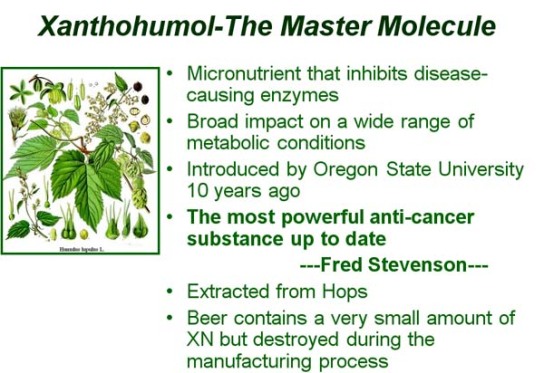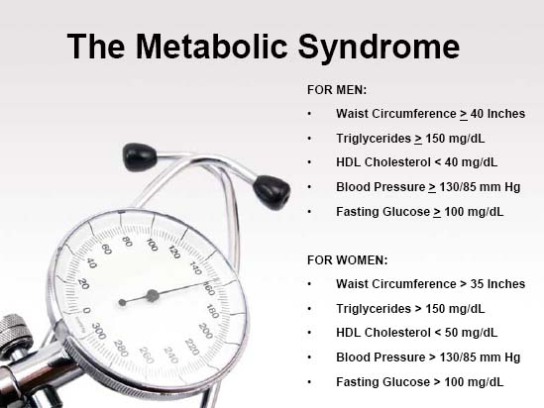Archive for January, 2008
Xanthohumol (XN)
Posted on January 30, 2008. Filed under: Xanthohumol (XN) | Tags: Hops, Plant, Xahthohumol, XN |

Xanthohumol is extracted from this plant called Hops.

Metabolic Balance vs Metabolic Imbalance vs Chronic Metabolic Imbalance
Posted on January 30, 2008. Filed under: Health Info | Tags: balance, cancer, chronic, diabetes, energy, fatique, health, heart diseases, imbalance, level, metabolic, obesity, run down, stroke, toxins, waste |
Metabolic Balance
Your body eliminates waste and toxins as fast as they are produced. You feel healthy, and have energy.
Your body can’t keep up causing waste and toxins to occasionally build up. You feel fatique and run down.
Chronic Metabolic Imbalance
Levels of waste and toxins stay elevated for an extended perio d of time leading to serious health concerns. If left unaddressed, it can lead to Metabolic Syndrome.
Now, you got some ideas about causes of metabolic stress, metabolic imbalance, metabolic syndrome (stroke, obesity, cancer, diabetes, heart diseases etc). Then, are we doomed? Isn’t there any treatment available? Can’t modern medical power solve this problem? There is an answer. We still have a hope. I am going to start sharing all the information that answer these questions. This is why I opened up this blog. I truly hope that everyone visiting my site would be benefited in some way or another.
How do you measure metabolic stress?
Posted on January 30, 2008. Filed under: Health Info | Tags: cholesterol, health, health improvement, imbalance, isoprostane, level, measure, metabolic, oxidative stress, stress |
Many markers of metabolic stress (eg, cholesterol) must be measured through blood tests in a healthcare provider’s office. Although these are important markers to follow, and for many people they should be regularly monitored, they only assess the health of specific systems.
Another important marker of metabolic stress is isoprostanes, which measure oxidative stress. Oxidative stress results from an imbalance in free radical production and antioxidant protection. Isoprostanes are a more general marker of overall health. High isoprostane levels, which reflect increased oxidative stress, are associated with poor health.
Measurement of isoprostanes should not replace measurement of other important markers but can be used in conjunction with them to assess your overall wellness and therapeutic progress.
Copyright BioNovix.com © 2007. All Rights Reserved
Read Full Post | Make a Comment ( None so far )How do I know if I have metabolic stress?
Posted on January 30, 2008. Filed under: Health Info | Tags: blood, cholesterol, cortisol, decreased, HDL, health, hormone, increased, inflammation, insulin, isoprostanes, metabolic, protein, reduced, stress, sugar, Triglycerides |
We all naturally experience peaks and valleys as various metabolic processes are turned on and off. So, it is not surprising that for many of us, one or more of these processes become imbalanced. You probably know many people who take medications to help lower cholesterol levels or blood sugar, for example. Although there are many possible contributing factors to these problems, metabolic stress is likely one of them.
-
Other markers of metabolic stress include:
-
Decreased HDL [“good”] cholesterol
-
Increased triglycerides
-
Reduced responsiveness to the actions of insulin, an important hormone that regulates blood sugar
-
Increased C-reactive protein, a measure of inflammation
-
Increased cortisol, a stress hormone
Isoprostanes, another important marker of metabolic stress, measure oxidative stress. Oxidative stress results from an imbalance in free radical production and antioxidant protection. Unlike markers that assess the health of specific systems (eg, cholesterol), isoprostanes are a general marker of overall health. High isoprostane levels, which reflect increased oxidative stress, are associated with poor health.
Many markers of metabolic stress must be measured through blood tests in a healthcare provider’s office. Soon, you will be able to measure your isoprostane levels in the privacy of your own home with minimal time, expense, and invasion of privacy. The Wellness Index Test™ introduces a new self-administered therapeutic diagnostic called Theranostics™. By measuring isoprostane in your system, you can find out your body’s level of oxidative stress.
Measurement of isoprostanes should not replace measurement of other important markers but can be used in conjunction with them to assess your overall wellness and therapeutic progress.
Copyright BioNovix.com © 2007. All Rights Reserved
Read Full Post | Make a Comment ( None so far )Causes of Metabolic Stress
Posted on January 30, 2008. Filed under: Health Info | Tags: causes, cells, cholesterol, chronic, energy, health, imbalances, isoprostanes, levels, metabolic stress, ocular, organs, oxidative, retinal, tissues |
Metabolic Imbalances
Metabolic stress is caused by chronic metabolic imbalances or the inability to appropriately regulate any of the vast number of biochemical reactions in the cells, tissues, and organs of our bodies. We all naturally experience peaks and valleys as various metabolic processes are turned on and off. However, over time, we may lose the ability to completely recover from these fluctuations. This can potentially contribute to chronic metabolic disorders.
You have probably heard of many of the common markers physicians use to evaluate the health of specific systems in our bodies but perhaps did not know they are also markers of metabolic stress. These markers include:
-
Decreased energy
-
Non-restful sleep
-
Decreased retinal and ocular health
-
Increased free-radical damage
-
Rising cholesterol levels
Imbalances in particular systems can manifest as changes in related markers. For example, an imbalance in our natural ability to regulate glucose production with glucose disposal manifests as elevated blood glucose and a reduced ability to respond to insulin.
You may not be familiar with another important marker of metabolic stress—isoprostanes. Isoprostanes measure oxidative stress, which results from an imbalance in free radical production and antioxidant protection. Unlike markers that assess the health of specific systems (eg, cholesterol), isoprostanes are a more general marker of overall health. High isoprostane levels, which reflect increased oxidative stress, are associated with poor health.
| Copyright BioNovix.com © 2007. All Rights Reserved | |
Causes of Metabolic Syndrome
Posted on January 30, 2008. Filed under: Health Info | Tags: causes, cholesterol, environmental pollution, exercise, food, genetic inheritance, health, health improvement, metabolic syndrome, oxidative stress, second hand smoke, stress, toxins, waste |
Then, what causes the metabolic syndrome?
The answer is metabolic stress. What is metabolic stress?
Metabolic stress is the burden on your body to manage and eliminate all of the waste and toxins your body creates and is exposed to every day. Metabolic stress is caused by factors such as food we consume, environmental pollution, stress, second hand smoke, genetic inheritance, and lack of exercise and more.
A build up of metabolic stress can cause you to feel fatigued and run down. It also causes cancer, diabetes, cardiovascular diseases, stroke, obesity, and infertility.
Consequences of Metabolic Stress:
If not controlled, metabolic stress can potentially contribute to chronic metabolic disorders. Metabolic stress may manifest as any of the following:
-
Decreased energy
-
Non-restful sleep
-
Decreased retinal and ocular health
-
Increased free-radical damage
-
Rising cholesterol levels
Metabolic stress may also manifest as increased isoprostane levels. Isoprostanes measure oxidative stress, which results from an imbalance in free radical production and antioxidant protection. Unlike markers that assess the health of specific systems (eg, cholesterol), isoprostanes are a more general marker of overall health. High isoprostane levels, which reflect increased oxidative stress, are associated with poor health.
Read Full Post | Make a Comment ( 1 so far )Metabolic Syndrome
Posted on January 30, 2008. Filed under: Health Info | Tags: blood pressure, cholesterol, circumference, glucose, HDL, health, health improvement, issues, medicine, metabolic, metabolic syndrome, syndrome, Triglycerides, waist |
As I mentioned earlier, bacterial diseases are controlled by modern medicine. The problem rises from metabolic syndrome. What is metabolic syndrome then?
Metabolic syndrome causes cardiovascular diseases, diabetes and other geriatric diseases that many Americans and people in the developed countries are struggling with. Even at this moment!
You have a metabolic syndrome if:

If you have high blood pressure, diabetes, and high cholesterol all together, it may cause 6 times to 9 times increased risk to your health compared to people who have one of these symptoms.
Read Full Post | Make a Comment ( None so far )3 Greatest Inventions in the Medical World
Posted on January 29, 2008. Filed under: Xanthohumol (XN) | Tags: Aspirin, disease, invention, metabolic, Penicillin, syndrome, Xanthohumol, XN |
Largely, there are two kinds of diseases: Bacterial disease (in vitro: originated from outer body) and Metabolic Syndrome (invivo: origin ated from inside of our body). There are 3 greatest inventions in the medical world: Penicillin, Aspirin and Xanthohumol (XN). Bacterial diseases have been controlled by penicillin. However, modern medical power cannot still solve the metabolic syndrome problems. It is an ongoing homework. In this blog, I will introduce the 3rd revolutionary invention, Xanthohumol and its great impacts on our diseases. I would like you to experience enormous benefits from XN.
ated from inside of our body). There are 3 greatest inventions in the medical world: Penicillin, Aspirin and Xanthohumol (XN). Bacterial diseases have been controlled by penicillin. However, modern medical power cannot still solve the metabolic syndrome problems. It is an ongoing homework. In this blog, I will introduce the 3rd revolutionary invention, Xanthohumol and its great impacts on our diseases. I would like you to experience enormous benefits from XN.

